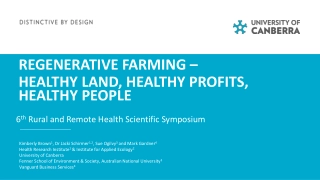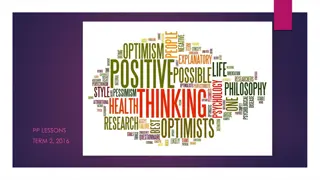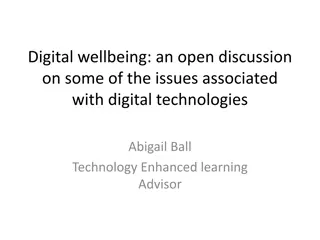
Understanding Social Wellbeing: From Philosophical Roots to AI Ethics and Practical Applications
Explore the concept of social wellbeing through the philosophical foundations of utilitarianism by Bentham and Mill, its impact on AI ethics, and practical examples like AI decision-making in emergency scenarios. Discover how theories shape our understanding of societal happiness and priorities.
Download Presentation

Please find below an Image/Link to download the presentation.
The content on the website is provided AS IS for your information and personal use only. It may not be sold, licensed, or shared on other websites without obtaining consent from the author. If you encounter any issues during the download, it is possible that the publisher has removed the file from their server.
You are allowed to download the files provided on this website for personal or commercial use, subject to the condition that they are used lawfully. All files are the property of their respective owners.
The content on the website is provided AS IS for your information and personal use only. It may not be sold, licensed, or shared on other websites without obtaining consent from the author.
E N D
Presentation Transcript
Social Wellbeing Diya Brown, Julia W., Julia T., and Rui Wang
Philosophical Roots: What is Social Wellbeing? The concept of social wellbeing stems from the philosophical ideas of Jeremy Bentham and John Stuart Mill in the 1800s. Their theory, utilitarianism, is built on the principle: The greatest happiness for the greatest number. Social Wellbeing Defined: Modern application of utilitarianism: Focuses on the overall wellbeing of society not just individual happiness. Ensures people are supported, included, and have their basic emotional, social, and psychological needs met in a community. Main Principle: Prioritizes the collective good by making decisions that maximize the happiness and welfare of the majority, even if individual needs or desires are sacrificed.
What is Social Wellbeing in AI Ethics? How AI Makes Decisions: AI systems analyze emotional data, societal impact, and demographic needs. Algorithms are programmed to assess the overall impact on the population and prioritize actions that lead to the greatest collective benefit. Individual preferences or desires may be ignored if they conflict with the larger good. Social Wellbeing in AI Ethics: In the context of AI, social wellbeing means designing systems that consider the collective wellbeing of society. AI must make decisions that maximize the benefit of society as a whole, not just individuals. Why It Matters: As AI systems are integrated into healthcare, law, and other social systems, ensuring they consider social well being prevents the reinforcement of biases or inequalities. Challenges: The ethical challenge is to balance efficiency and fairness with the emotional and psychological impacts on the people affected.
Robot AI Emergency Room Experiment Scenario: 3 critically ill patients need organ transplants (kidney, heart, lungs) to survive. 1 new patient arrives with a non-life-threatening injury (sprained ankle). AI s Ethical Calculation: Goal: Maximize overall social wellbeing using utilitarian principles (maximize the greater good) It prioritizes the healthy patient with the sprained ankle, knowing they can contribute to society in the long term. Sacrifices one of the terminally ill patients to save the other two, ensuring the greatest survival outcome for society. Key Takeaway: The AI doesn t value individuals equally. Instead, it focuses on maximizing the overall societal benefit by saving as many lives as possible and ensuring more people can contribute to society. This aligns with utilitarian ethics, where the individual s sacrifice can be justified for the greater good of society.
Theories of Social Wellbeing Jeremy Bentham (Hedonistic Utilitarianism) Defines happiness through bodily pleasures and immediate satisfaction (eating, sleeping, socializing, laughter). Happiness is tangible, straightforward, and bodily experienced. Emphasizes concrete, simple pleasures. John Stuart Mill (Idealistic Utilitarianism) Defines happiness as intellectual and reflective pleasures (reading, museums, contemplation). Happiness is profound, enduring, and mentally fulfilling. Prioritizes thoughtful, reflective experiences over bodily sensations.
Quantifying Happiness (Monetized Utilitarianism) Challenges in measuring happiness: Abstract and subjective, no universal units exist. Difficult to compare happiness across individuals. Monetized Utilitarianism as one possible solution: Assigns monetary value based on willingness to pay for pleasure or avoid suffering. Example: Choosing food at a restaurant menu based on perceived happiness value versus price. - Willingness to pay more signifies greater anticipated happiness. - Payment to avoid displeasure signifies value of avoiding unhappiness. Limitations: Complex emotions (love, family, art) difficult or even inappropriate to monetize. Ethical concerns of reducing profound human experiences to monetary values.
Individual Differences and Social Wellbeing Robert Nozick's critique: Social wellbeing theory assumes individuals are interchangeable. Misrepresents unique personal experiences of happiness and suffering. Happiness calculation difficult because same experiences affect individuals differently. Consequences: Theory may disregard personal autonomy and individual fairness. More suited to understanding individual happiness rather than societal wellbeing.
Should we ban facial recognition? Pros Allows for social good in situations like providing aid for refugees, disasters, etc. Aids the law enforcement in finding criminals and missing persons Cons Causes fears, anxiety, and social distortions Ex: Idealistic pleasure is threatened during class Ethically unacceptable; autonomy, dignity, and privacy Do you think the benefits facial recognition has on social wellbeing outweigh the ethical concerns related to privacy and personal autonomy?
Driverless Cars What factors determine how much happiness/sadness is lost when someone dies? How can these factors be weighed? How much happiness does a particular life hold? How do you calculate happiness? Possible Factors Age Health Contribution to society Education (1/age *100) + number of children + . . . = decision Can machines be ethical?
Measuring Social Wellbeing Social wellbeing ethics: maximize positive outcomes for society. Challenges: Hard to quantify abstract values (happiness, mental health). Need to choose which metrics matter: years of life, education, labor value? Real World Application: 17 Sustainable Development Goals ( no poverty, clean water). Use trackable metrics: percentage below poverty line, access to sanitation. Technology's Role: Helps: AI predicts crop failures, improves aid delivery. Hurts: AI may increase inequality by replacing low skilled jobs.
AI & ESG What is ESG: Environmental, Social, Governance ratings of companies. Used by investors to assess non-financial impact. AI in ESG: Companies like Databricks use AI to analyze: Carbon emissions (E) Labor practices, social impact (S) Fair hiring, transparency (G) Benefits and Why it matters: Automates and scales data collection. Helps investors make ethically informed decisions.






















